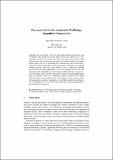Persuasive Cities for Sustainable Wellbeing: Quantified Communities
Author(s)
Stibe, Agnis; Larson, Kent
DownloadStibe_2016b_Persuasive_Cities.pdf (441.4Kb)
PUBLISHER_POLICY
Publisher Policy
Article is made available in accordance with the publisher's policy and may be subject to US copyright law. Please refer to the publisher's site for terms of use.
Terms of use
Metadata
Show full item recordAbstract
Can you imagine a city that feels, understands, and cares about your wellbeing? Future cities will reshape human behavior in countless ways. New strategies and models are required for future urban spaces to properly respond to human activity, environmental conditions, and market dynamics. Persuasive urban systems will play an important role in making cities more livable and resource-efficient by addressing current environmental challenges and enabling healthier routines. Persuasive cities research aims at improving wellbeing across societies through applications of socio-psychological theories and their integration with conceptually new urban designs. This research presents an ecosystem of future cities, describes three generic groups of people depending on their susceptibility to persuasive technology, explains the process of defining behavior change, and provides tools for social engineering of persuasive cities. Advancing this research is important as it scaffolds scientific knowledge on how to design persuasive cities and refines guidelines for practical applications in achieving their emergence.
Date issued
2016-08Department
Massachusetts Institute of Technology. Media LaboratoryJournal
Mobile Web and Intelligent Information Systems
Publisher
Springer International Publishing
Citation
Stibe, Agnis and Larson, Kent. “Persuasive Cities for Sustainable Wellbeing: Quantified Communities.” Lecture Notes in Computer Science (August 2016): 271–282. © 2016 Springer International Publishing Switzerland
Version: Author's final manuscript
ISSN
0302-9743
1611-3349